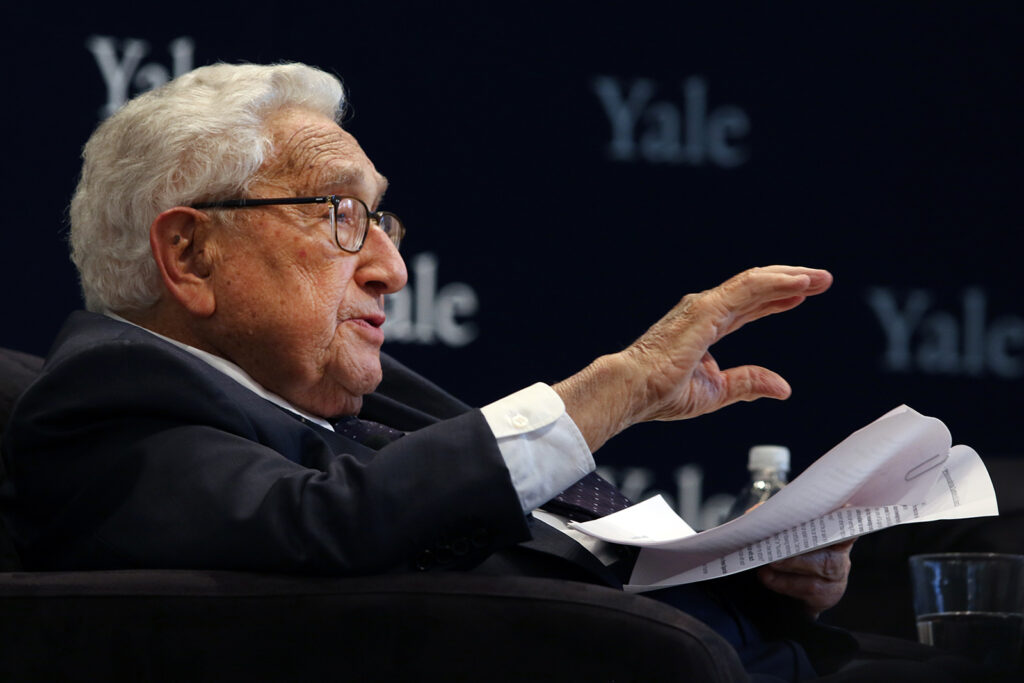1923 – 2023

John Lewis Gaddis, Robert A. Lovett Professor of Military & Naval History
Excerpt from Henry at Yale
“Kissinger greeted me amicably, said he’d long wanted to meet me, and immediately launched into a critique of my NATO expansion op-ed from last week—it seemed I’d got the Concert of Europe wrong. The date was May 4, 1998, the location the Kissinger apartment in New York, and the occasion a dinner for the deputy prime minister of Singapore. It was also my first meeting with Dr. Kissinger, who immediately made it seem right to call him ‘Henry.’ While at the same time inviting, as they say in diplomacy, a full and frank exchange of views. I’d written a lot about him by then, most recently an essay in which I’d suggested that some future Kissinger, in his capacity as a historian, might come to see the past Kissinger, in his role as a statesman, ‘as having been, like Metternich and Bismarck, in just the right place at the right time, thereby fulfilling in history, as well as in life, the man’s incorrigible determination to be at the center of it all.’ It’s one of the few things I’ve said about Henry that he’s never seen fit to question.”
Rick Levin, former president of Yale University
“Henry Kissinger’s gift of his papers to Yale is a priceless legacy. For historians of diplomacy and specialists in international relations, its value is beyond measure. Together with the papers of Colonel House, Henry Stimson, Dean Acheson, and Cyrus Vance, the Kissinger papers establish Yale as an unmatched place for the study of 20th century diplomatic history.
Dr. Kissinger’s “realist” approach to foreign policy may not have appealed to everyone, but no one else engaged in international affairs over the past six decades combined such a deep knowledge of history with such a penetrating awareness of current affairs. For the past two decades, he has argued that the object of U.S. policy toward China should be a stable bipolar world order, which makes far more sense than the paranoia that dominates discussion in Washington today.”
Jim Levinsohn, dean of the Jackson School of Global Affairs
“Dr. Kissinger’s passing is a poignant moment but also an opportunity to reflect on his rather extraordinary life, exceptional longevity, and enduring contributions as a scholar and practitioner of global affairs. I first met Dr. Kissinger in 2011, around the time when he donated his papers to Yale as the foundation of the Johnson Center for the Study of American Diplomacy. A program of the Jackson School, in collaboration with International Security Studies, the Brady-Johnson Program in Grand Strategy, and the Yale University Library, the center brings practitioners and scholars to campus as Kissinger Senior Fellows and Kissinger Visiting Scholars, as well as hosts annual conferences and other activities in international affairs.
Distinguished diplomats such as ambassadors Marc Grossman, Ryan Crocker, Dennis Ross, Robert Ford, and Harry Thomas joined the Jackson School as Senior Fellows through this program, teaching our students and bringing their real-world experiences into the classroom, enriching the Yale community. Students and scholars alike continue to research the Kissinger Papers thanks to the outstanding work of Manuscripts and Archives at the Yale Library.
Dr. Kissinger’s life in many ways reflects the history of American foreign policy in the twentieth century, full of astonishing successes alongside deep disappointments. His contributions to U.S.-China relations and Middle East crisis diplomacy, to name just a few areas, remain as relevant as ever. Students continue to learn from and grapple with Dr. Kissinger’s legacy, and all its complexities, as we reflect on today’s contemporary challenges in global affairs.”
Ted Wittenstein, executive director, Johnson Center for the Study of American Diplomacy
“Dr. Kissinger’s passing is an opportunity to reflect on his monumental contributions to the study and practice of diplomacy. He was a scholar-statesman of profound historical significance, who remained deeply engaged world affairs until the very end.
It is hard to believe, but Dr. Kissinger visited Xi Jinping in Beijing this past July at 100-years-old. His most recent piece in Foreign Affairs was published just last month in October, warning of the dangers of artificial intelligence and the need for arms control with China—a strategic approach that featured prominently in the recent Biden-Xi summit in San Francisco. Dr. Kissinger’s insatiable intellectual curiosity seemed to be key to his longevity. How a centenarian could even grasp the technical challenges posed by AI, let alone contribute to significant policy debates, remains a mystery to me.
The donation of Dr. Kissinger’s papers to Yale, and the establishment of the Johnson Center for the Study of American Diplomacy, represented a watershed moment for Yale and for diplomatic history in general.
Dr. Kissinger always was eager to interact with our students, and he was inspired their boundless enthusiasm. He especially enjoyed the opportunity to engage with scholars, practitioners, and students whose views differed from his own. The Johnson Center’s annual conferences also helped inform Dr. Kissinger’s own scholarship, with books On China, World Order, The Age of AI, and Leadership benefiting from those sessions.
The Kissinger Papers continue to be invaluable resources for students and scholars alike. The archives represent an unparalleled opportunity to study all the many complexities and contradictions that characterize American diplomacy in the twentieth century. We are so grateful for the generosity of Charlie Johnson and Nick Brady for making these arrangements possible.”